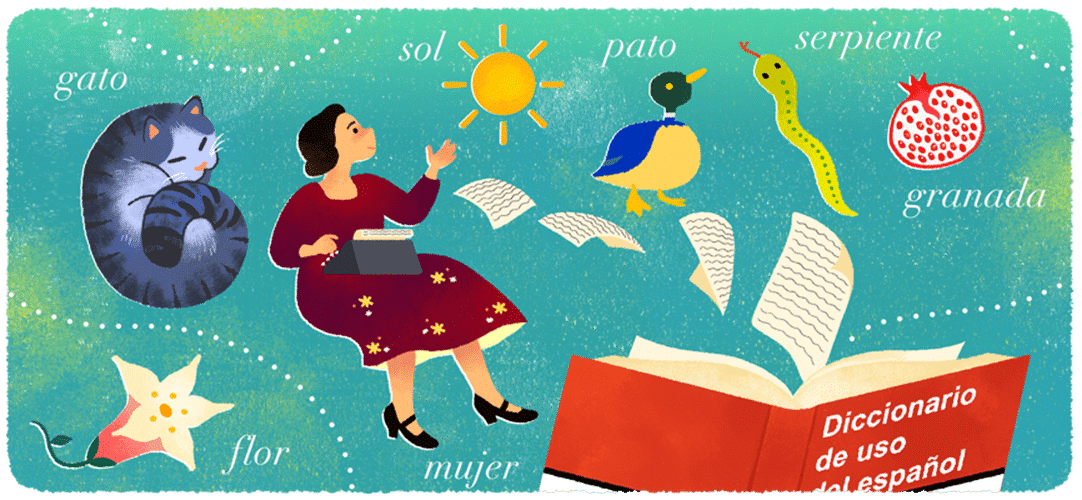María Moliner: Spanish Lexicographer

Image Courtesy: Google Doodle
María Moliner (30 March 1900 – 22 January 1981) was a Spanish librarian, lexicographer, and feminist.
Life and Career
She was born on 30 March 1900, in Paniza, Zaragoza, Spain. Moliner began working as a librarian at age 22 and was elected head of the University of Valencia library in 1936. She took a special interest in the popular libraries project, developing a plan for Bibliotecas Rurales (Rural Libraries) to help promote literacy and culture. Following the Spanish Civil War, her family was penalized by the new authoritarian government, causing her to be passed over for faculty promotions.
Moliner began compiling her Diccionario de Uso del Español (Dictionary of Spanish Use) in 1952, working at home before and after her day job. A mother of four as well as a grandmother, she had extraordinary powers of concentration. Moliner would research words read in newspapers or heard on the street, aiming to outdo the dictionary published by the Real Academia Española. “The Academy dictionary is the dictionary of authority,” she once said. “Mine has not had much regard for authority.”
Moliner’s most notable achievement was the creation of the “Diccionario de uso del español,” a dictionary of the Spanish language that she worked on for 15 years, from 1952 to 1967. Moliner undertook this task on her own, without any institutional support or funding, and completed the work of over 1,000 pages. The dictionary is still considered a masterpiece of lexicography and has been praised for its thoroughness, accuracy, and attention to detail.
In addition to her work as a lexicographer, Moliner was also a librarian and a passionate advocate for the rights of women. She was a member of the Spanish Socialist Party and was an outspoken critic of the Franco regime. She also actively supported feminist causes, and was a founding member of the Spanish Federation of University Women. Moliner’s contributions to the Spanish language and to the feminist movement have been widely recognized and celebrated. She passed away on 22 January 1981, in Madrid, Spain, at the age of 80.
Award and Legacy
María Moliner’s legacy is primarily centered around her work on the “Diccionario de uso del español,” which is still widely used and respected today. The dictionary is known for its thoroughness, accuracy, and attention to detail, and is considered a masterpiece of lexicography.
Moliner’s contributions to Spanish culture and society have been recognized with numerous awards and honors. In addition to the Gold Medal of Fine Arts and her election to the Royal Spanish Academy, she was also awarded the Medal of Merit in Work in 1978.
In recent years, Moliner’s work has been celebrated in a variety of ways. In 2018, the Cervantes Institute in Madrid held an exhibition to commemorate the 50th anniversary of the publication of the “Diccionario de uso del español.” In 1967, she was awarded the Gold Medal of Fine Arts by the Spanish government, and in 1973 she was elected to the Royal Spanish Academy, becoming the third woman ever to do so. On 30 March 2019, Google celebrated María Moliner’s 119th Birthday with a doodle.
Moliner’s legacy extends beyond her work as a lexicographer, however. She was a passionate advocate for the rights of women and for gender equality, and her work in this area continues to inspire feminists in Spain and around the world. Overall, María Moliner’s contributions to language, knowledge, and social justice have made her a beloved figure in Spanish culture and a role model for generations of women.
Observer Voice is the one stop site for National, International news, Sports, Editor’s Choice, Art/culture contents, Quotes and much more. We also cover historical contents. Historical contents includes World History, Indian History, and what happened today. The website also covers Entertainment across the India and World.

